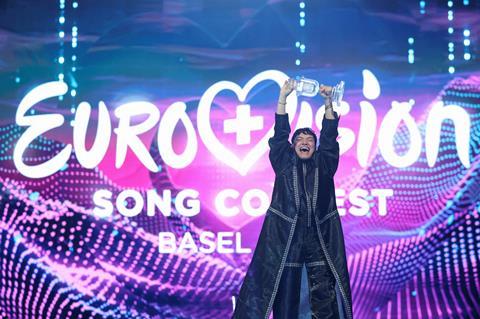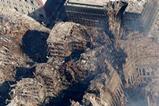Eurovision broadcaster and Methodist preacher, Lisa-Jayne Lewis says the song contest is about far more than just glitter and spectacle. It’s an encounter with something bigger, and it’s packed full with sacred possibilities

Did you, like eight million other viewers in the UK, tune into BBC One on Saturday night to watch the Eurovision Song Contest?
Maybe you watched with friends, maybe you dipped in between cups of tea, or maybe you only caught the voting — but chances are, you saw at least some of it.
What you saw was a spectacle: 26 acts from across Europe (and beyond) – 37 if you count the semi finals, singing under blazing lights, with everything from drag queens to folklore to lasers and pyros. What you might not have seen is the other story — the one that unfolds behind the glitter. A story of people.
As a Eurovision broadcaster and commentator with over a decade of experience, and also a Methodist local preacher, I live in both those worlds — music and ministry, sequins and scripture. And what I’ve discovered is that faith and Eurovision have more in common than you might think.
Because while the contest is officially apolitical and non-religious, it’s also deeply human. And humans don’t live in a bubble and neither does Eurovision. We carry our politics, our cultures, and yes — our faith — with us wherever we go. Maybe even into the world of Eurovision.
The Unofficial Pilgrimage
Each May, thousands of people pack their flags and hopes into suitcases and travel across Europe to gather for the Eurovision Song Contest. On the surface, it’s just a televised music competition — but speak to anyone who’s been involved for more than a passing year, and you’ll hear it described in strikingly spiritual terms: “life-changing,” “sacred,” “a homecoming,” “finding my tribe.”
In many ways, it’s a kind of secular pilgrimage. There are rituals — the national final season, the allocation draw, the pre-parties, visiting former venues. There are sacred objects — laminated accreditations, the host city key ring insignia, national flags and scarves. There are gathering points — EuroClub, Euro Village, in Basel there is a Eurovision Square, and of course the arena — where people reunite with friends made in Kyiv, Torino, Liverpool or another far flung corner of the continent. Some attend year after year, regardless of whether their country is in or out. Others save for a lifetime to go just once.
But beyond the glitter, there’s something deeper that calls people back. Eurovision is a celebration of humanity — in all its messiness, creativity, and challenges. It offers a space where people can be fully themselves, sometimes for the first time. It’s about belonging. It’s about being seen. And at its most profound, it becomes a space of transformation — the same kind of transformation people have always sought on pilgrimage.
No one’s preaching. But that doesn’t mean faith isn’t alive and visible
As someone who knows both the buzz of backstage and the stillness of a Sunday service, I see the similarities clearly. Pilgrimage is not necessarily about geography; it’s far more about encounter. Encounter with one another. Encounter with something bigger. Eurovision, despite its non-religious status, is often filled with those moments.
Eurovision may be officially non-religious, but the people who make it happen are not. In the arena, backstage, in dressing rooms and delegations, and in the media centre and the audience — faith is present because people of faith are present.
Muslims, Jews, and Christians (in all their expressions) are part of the Eurovision family — as artists, dancers, broadcasters, technicians, and fans. I’ve prayed with friends and colleagues in the media centre, seen artists quietly cross themselves before stepping on stage, had conversations about faith with Azerbaijani Muslim friends and visited the Western Wall in Jerusalem with Israeli journalist friends.
No one’s preaching. No one’s converting. But that doesn’t mean faith isn’t alive and visible. It’s part of the human mix — a quiet presence, woven into the fabric of this colourful, global community.
Holy Ground, Glitter Stage
Each year, a new Eurovision stage rises from nothing — rigged with light, screens, and possibilities. It’s a technological marvel, but more than that, it becomes a platform where something profoundly human can unfold. For three minutes at a time, artists are given a rare gift: the world’s attention. And in that space, something sacred often breaks through.
I’ve stood just feet away from performances that changed the atmosphere in the room. Jamala’s ‘1944’ (Ukraine 2016) was one of them — raw, historical, painful, prophetic. You could feel the stillness fall over the audience, a kind of reverence, like holding your breath in a cathedral. Or Marija Šerifović’s ‘Molitva’ (Serbia 2007), a stirring, string-driven ballad that captures raw emotion and quiet strength. And then there are the moments of joy and catharsis — not shallow, but defiantly life-affirming, like Käärijä’s riot of colour in ‘Cha Cha Cha’ (Finland 2023) and The Roop’s infectious energy in ‘Discoteque’ (Lithuania 2021).
These aren’t just songs. They’re confessions, laments and celebrations. Some artists bring their culture, others bring their politics, others bring their trauma or their joy — and in doing so, they open an open, welcoming space that feels remarkably like the kind we try to create in our churches.
Behind the Curtain
I’ve come to believe that the Divine isn’t fussy about where holiness happens. A chapel, a living room, a Eurovision bubble — all are fair ground. The sacred shows up where truth is spoken, where vulnerability is offered, where humanity is honoured. And when that happens something greater than us is present, even if it’s never named.
Strip away the costumes, the cameras, the commentary — and like all of us, I’m just a person, trying to live with integrity and hope. Or as Singer-songwriter Lucio Corsi (Italy 2025) puts it in his song from Saturday night “non sono altro che Lucio” — I am nothing more than Lucio.




































No comments yet